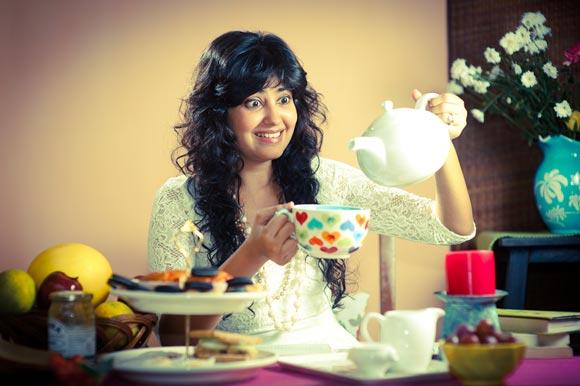
As part of our series on unusual careers, we meet up with Snigdha Manchanda Binjola, a 29-year-old entrepreneur who is a tea sommelier and a 'chief storyteller'. So what is it that she does exactly? Abhishek Mande takes her out for a cup of tea and returns with this story.
It started with a trunk; a slightly rusting iron trunk, to be precise -- the kinds our fathers and grandfathers carried each time they embarked upon a journey, carrying practically everything they needed to set up their lives in places they visited.
Later, when more stylish and manageable luggage came into fashion, trunks quite like the slightly rusting metal one fell out of fashion. Just as he was about to throw it away though, a teenaged Snigdha Manchanda managed to convince her father to leave it for her.
It was perfect, she told him, for her tea collection. Not postal stamps or Barbies or action figures or toys, but teas.
What she didn't realise then was that the almost-discarded iron trunk would start her out on a fascinating journey, one that few ever dare to take.
If you'd have known her in school you would have thought her slightly weird. She collected teas, for starters (who collects teas when they're 13, or 15, or even 30, for that matter?) and each day the water in her bottle would taste different because when her mother would boil it every morning, she would make it a point to toss a bit of spice or herbs into it.
In some ways this 'medicinal water' of sorts was the beginning of what would be Snigdha's lifetime obsession.
Each day, as she drank waters that tasted different, her palette was beginning to grow sensitive to tastes that most of us take for granted. It would be another couple of decades before she would realise that coupled with her strange hobby of collecting teas, this daily ritual would in fact help her train to be one of India's youngest tea sommelier.
Earlier in this series:
Tropical forests are her office
He goes to work 500 feet under the sea
He took a break from school to study snakes
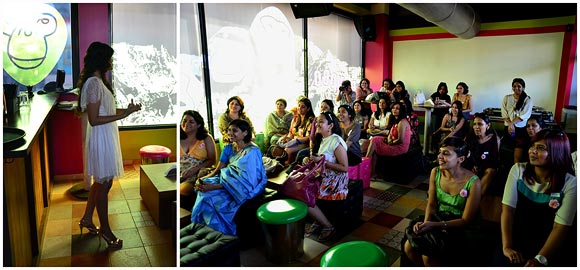
In a country that is still trying to grapple with the idea of a wine sommelier, it isn't unusual for Snigdha Manchanda Binjola to be asked what exactly it is that she does. As she tries to explain that she tells people how to drink tea, most give her the questioning look that suggests 'Why do we need to be told how to have tea?'
Thanks to the Brits, who decided to stay on in India for more than three centuries, tea is pretty much the beverage India wakes up to each day. How, then, do you tell a culture that has been having chai for at least half-a-dozen generations how to appreciate it?
Snigdha chooses the quaint colonial Tea Centre, Mumbai's oldest tea cafe, for our meeting, where it is blasphemous for table legs to be seen and rude for waiters to be summoned using hand gestures (you have a bell on your table for that, you see).
She orders pasta baked in creamy tomato sauce with sauteed mushrooms and a Darjeeling Pearl Tea for me. For herself, she orders Fish in Lemon Sauce that is served with a helping of mashed potatoes and stir-fried vegetables, along with a Blood Orange Tea.
I squirm a bit. You don't order fish in a restaurant on a Monday. Or at least if you believe New York chef Anthony Bourdain, you shouldn't. Often, restaurant chefs like to get rid of their leftover weekend stock on Monday. "He anticipates the likelihood that he might still have some fish lying around on Monday morning -- and he'd like to get money for it without poisoning his customers," Bourdain writes. "If it still smells okay on Monday (...) you're eating it!"
Nonetheless, I shut up. She, I remind myself, is the sommelier. Not me.
The fish looks appetising and although I am tempted to try it, Bourdain keeps popping into my head. I dig into my pasta, which seems to have a generous dose of mushroom and olives.
"Darjeeling Tea goes well with olives and cheese and most tomato-based curries. It is light, so you need food that has a sharp taste to it, but not as sharp as, say mustard. That would be a bad idea," she enlightens me.
When the tea arrives, Snigdha explains that the bouquet and the taste should ideally reveal to you the garden from where the tea has been plucked. She asks if she could have a sip. I wait in anticipation. "Hmmm," she muses and puts the cup down.
Like an idiot, I gulp the golden liquid like I have my chai in the mornings. If Snigdha makes a face, I don't see it. Then I try again. I swirl half the sip in my mouth (quite like I do with wines, when I am pretending to know all about them) and drink it.
She looks at me in anticipation now. I inhale deeply, put the cup down and give my verdict: "Naah, I don't understand a thing here!"
Snigdha laughs, but I now begin to see what it is she does.
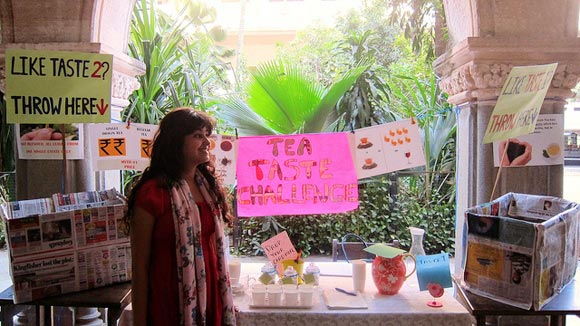
There are three popular types of Indian tea -- Assam, Teas of North Bengal and Nilgiris. Within each type, there are hundreds of different variations, depending upon the refining process and season of plucking.
Green and Black Tea -- CTC and Orthodox -- are popular in India. The other types of teas like Oolong, Pu'erh, white tea etc are rather unexplored. Some of these are as expensive as silver.
Most Indians, however, rarely go beyond the Assam Tea that is brewed in our kitchens each morning. Some, slightly more experimental people venture out and try green tea, which has been taking the tea market in India by storm lately.
The green tea-wallahs are a unique breed. Most I have come across like to see themselves as connoisseurs of tea because they've tried something beyond chai. They'll endlessly bore you with the health benefits of green tea and whether you like it or not, pour some down your throat.
It is, however, the Oolong-loving folk that Snigdha finds are the most evolved souls. What tea you like, she says, tells a lot about who you are.
"When women, especially, tell me they like Oolong, I know instantly that they are well-travelled and have discovered that there's more to life than green tea," she laughs.
Yes, but what about people like me who like their masala chai, I ask, half-intrigued.
"It means you are rooted to your traditions. You like simple things in life. And chances are you've probably not tasted any other tea!"
On behalf of all my masala chai-drinking brethren, I raise a feeble objection but I realise that there is some truth to what she says.
Snigdha uses this insight into people to customise tea blends for them. Currently, her company Tea Trunk (named after that magical piece of luggage from where it all started), is tying up with wedding planners to make customised teas for couples. These blends are sent out with their invitation cards and are part of the menu on their wedding day.
The thing with teas is that they can be had in more ways than you can imagine. When she hosts parties at home, Snigdha mixes vodkas and scotches with tea concoctions; on her blog there's a recipe for tea lassi; the combinations are endless, she says.
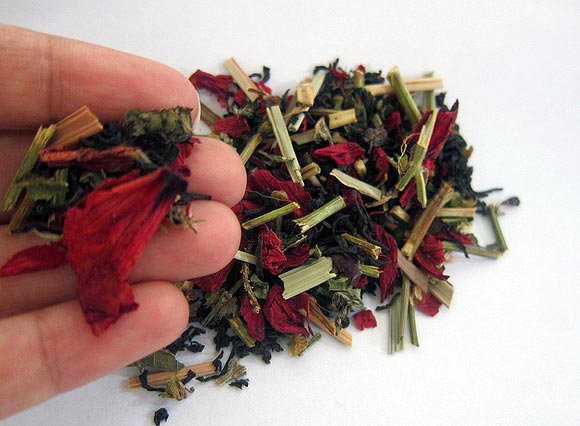
Snigdha owns more than 100 exotic and rare teas from around the world, from countries like Russia, Kenya, Turkey and Egypt, as well as China, Japan and Sri Lanka. Many of them she's received as gifts, from people around the world who know of her fascination for teas. Others she's painstakingly hunted for and bought herself.
The interest in teas started when she was still a child. Her father, an ONGC employee then posted in Assam, would often bring home bags of tea from work. Then she began requesting friends and family who were travelling to get more varieties of tea for her and the collection that eventually found its way into the trunk grew.
Yet for the longest time -- as recently as 2011 – making a career in the tea business was never really something Snigdha considered.
As a child she wanted to be an author, with absolutely no idea what she wanted to write about. She loved Ruskin Bond, his writing and his life painted an idyllic picture of who she wanted to be when she grew up. (She did eventually meet Bond over a cup of tea at his Mussoorie home -- a wedding gift of sorts from her husband Vipul).
Yet, when it was time to step into the real world, she completed her bachelor's degree in management from a Mumbai college and joined the writing/editing industry. During her stint at KPO Cactus Communications she headed the client servicing division and then as part of the team that set up Crimson Interactive (both in Mumbai), she led a team as Communication and Change Leader.
In every entrepreneur's life there comes a time when you realise you aren't cut out quite like your working-class colleagues -- dragging yourself to work in the morning, holding down the same routine for years on end. With Snigdha, the realisation came a few years into her profession. So she quit and decided to venture out on her own.
During her stint in the KPOs, two things happened that eventually would help her decide what she wanted to do with her life. On one hand, she came across a paper on the commonality in storytelling techniques across cultures and the use of these techniques in the modern world; on the other, her many interactions with her Japanese colleagues piqued her interest in tea further.
So when the time came to venture out on her own, Snigdha knew exactly what she wanted to do. Interestingly, it had nothing to do with tea.
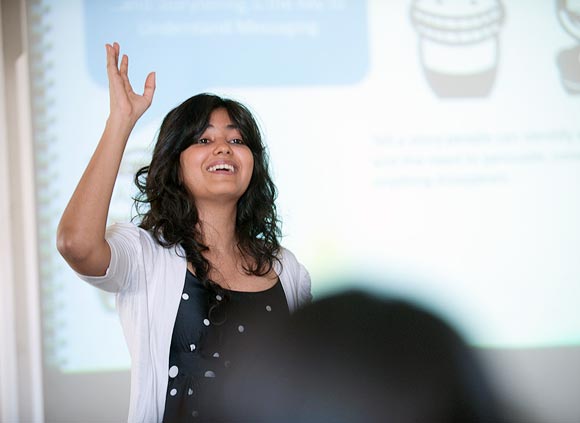
In 2009, Snigdha started out with Story Ninja, a company that 'teaches businesses the power of narratives' where she is the 'chief storyteller'.
"All this while, tea had just been a hobby. Since I was working in the field of communications, I knew what I was hoping to do at Story Ninja would be an extension of what I had been doing all this time. Also, I wasn't quite sure about what to take up without some sort of formal training in tea. So it made more sense to start something like Story Ninja," she explains.
"Back then, companies were excited about launching their own Facebook and Twitter pages. The question I was asking was, what is that you want to tell people who visit them? Unlike in television, print or radio where you can create an ad campaign and run it for the next three months, the online medium needs new content not just every day but practically every hour. You cannot have the same status message twice over, ever. At Story Ninja, I adapt storytelling techniques in digital campaigns to design content strategies as well as leverage stories to helpindividuals and companies craft their bios."
Alongside her career as a tea sommelier, Snigdha has kept Story Ninja running, working with ad agencies and helping create social media strategies for a leading group of luxury hotels, a celebrity charity, banks, insurance companies and a popular fashion label. She also organises what she calls 'Story Clinics', where she helps individuals and start-ups create effective bios for their 'About Me' page.
"Ideas come and go, stories stay," Snigdha says, quoting essayist Nassim Nicholas Taleb. She then asks if I recollect Airtel's campaign to name its new logo. "It was a great idea and they were seemingly doing everything right, what with crowd sourcing and all. But do you remember who won the contest to name the logo or what the logo was called, for that matter?" she questions.
"On the other hand you have Vodafone's ZooZoos, which will continue to stay in people's memories. They will be stuff that children of this generation will remember growing up with. What made the ZooZoos so successful was that they told stories. That's the importance of stories in today's age."
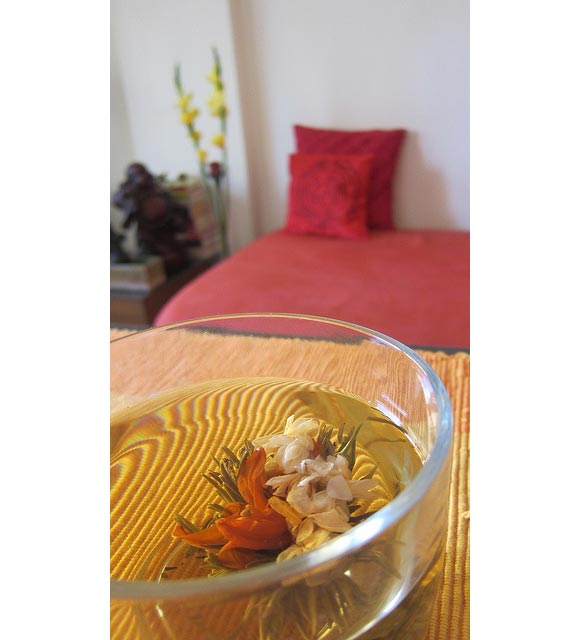
It wasn't until late 2011, with Story Ninja up and running, that Snigdha even considered taking her passion for tea forward. Sure, she loved her teas and her collection was growing. And the truth is that she was more obsessed with them than ever before -- her office boys knew exactly what tea she'd need for which time of the day. She'd been reading up on everything related to tea, but she lacked the formal training that set a sommelier apart and so made it a priority.
"To find a school to train me in teas itself took a year. Also, since the school I finally ended up in conducts courses only twice a year for a month each, there was some more waiting involved. Finally, in September 2011, I enrolled for a course at the Tea Sommelier Academy in Colombo, which is taught by a Japanese tea master Nao Kumekawa, who has settled in Sri Lanka," she says, describing Kumekawa as a sensei from action movie Kill Bill -- a taskmaster who wouldn't take no for an answer.
"Our day would begin at a really long table that had 100 cups of tea. The task was to taste each tea and write out a flavour profile. We would start out in the morning and had to reach the final cup before the end of the day. On one occasion, I was stuck on the 66th tea and my sensei refused to let me move on! He insisted I get it right before I go ahead," Snigdha recalls.
"If you're a musician you play more music. If you're a cricketer you play more cricket to get better at it. But how do you better your palette? You can't! You're either born with it or you aren't," she says adding, "Working on your palette is a deep meditative process and requires you to gather all your senses and energy. When I am tasting teas, it's almost a spiritual experience for me."
It took her an hour to crack it. At the end of the day, though, her sensei gave her a piece of advice she's never forgotten: "'Don't let your brain tell your tongue,' he said. 'Let your tongue tell your brain.'"
After that, it was a breeze. A month later, Singdha returned to the city and with the help of her mother and Pooja Dhingra, proprietor of Le15 (a prominent Mumbai patisserie), she organised an event cheekily called the Chari-Tea Party.
"At the end of the evening, we managed to donate a reasonable sum of money to the Rahee Foundation, an NGO that uses sports as a medium to address the issues of substance abuse and high dropout rates from schools," she recollects.
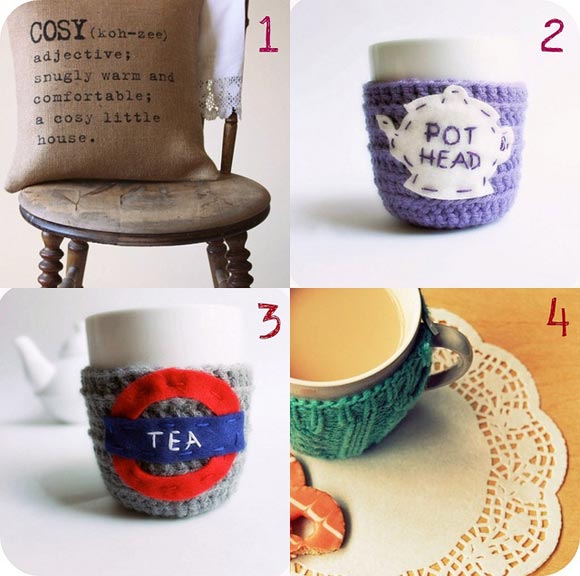
Since then, Snigdha has been going places with her tea workshops. More recently, she was invited to the Kala Ghoda Festival, a prominent Mumbai fest that celebrates art, crafts and literature, among other things, after which she's been organising more tea workshops and tea parties than ever.
She tells me she's particularly looking forward to one that she's been asked to organise for a group of power women from Wall Street, which is a challenge considering "all these women are well-travelled and it'll be interesting to cater to their tastes."
For now, Snigdha operates out of Bombay Hub, a 'plug-and-play' working space for freelance professionals such as herself. She uses it to juggle both companies -- Story Ninja and Tea Trunk, which is just beginning to find its feet
Soon, however, she plans to set up a tea studio not very far from where she stays in the western suburb of Malad, which will also have a tea lounge.
"The business of making new blends of teas is a complex business," she tells me, "Quite like a chemistry lab. I was in need of an independent space for a while now."
It's in this tea studio that Snigdha hopes to create more customised blends and promote little-known teas from India "because it's blasphemous that we import packaged tea, which in fact is grown in India and exported."
Perhaps it will be a while before she achieves this, but she's willing to work toward it patiently. That's how it has always been with Snigdha -- both she and her husband (a Bollywood script writer who's written movies such as Buddha Hoga Tera Baap, among others), are freelancers and don't always know when to expect their next pay check. Towards the end of our meeting, I ask her if this uncertainty doesn't bother them.
"It doesn't," she says rather matter-of-factly. "Sure there are times when you worry a little, but you really must have a positive approach to life and you'll see it isn't very difficult. Of course there was a lot of math involved before I decided to quit my job. We did save up and we did give it a serious thought. But we were prepared for it. And it's fine."
When I ask her what challenges she's faced as an entrepreneur, she promptly replies, "My age!"
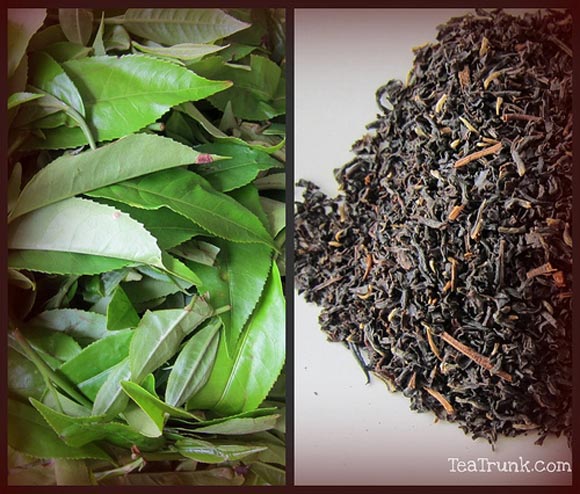
Like many young people at the helm of a start-up, Snigdha deals with clients almost twice her age. Often they look at her suspiciously, unsure of whether they should believe her or not. Then, at the end of the workshop, they usually congratulate her, pat her on the back and exclaim: "But you're so young!"
"What's age got to do with it?" Snigdha asks me rhetorically, somewhat bemused. "Just because you're good at something doesn't mean you have to be old too. I believe in Malcolm Gladwell's 10,000-hour rule (which suggests that the key to success in anything lies in practicing a specific task for around 10,000 hours). I just happened to invest a good deal of time in my passion early on in my life and that's quite simply the reason why I'm good at something.
It's been a while since we started our day at Tea Centre in South Mumbai. Now, we're at her home, a sparsely yet tastefully decorated apartment in Malad. Vipul welcomes us as we talk about this and that.
On one table, they've displayed four packets of teas that have arrived as gifts from one of their friends. Most others, Snigdha tells me, have been packed in cartons and are waiting to be transported to the new tea studio.
I'm beginning to get a splitting headache thanks to the summer sun and we settle for a round of tea -- a cup of Oolong is poured out for the three of us.
Later, when I ask about her favourite tea, she tells me it's one she tasted while at a tea estate in Sri Lanka, where she helped the ladies pluck tea leaves at 5 am and then indulged in a cup of brew prepared fresh at the factory.
"Apart from that I love a good Sencha (Japanese steamed green tea)," she says, "I often brew a cup when I think of my sensei who taught me everything I know about tea and my Japanese colleagues who fuelled my love for the brew."
I take the first sip and notice that the centre table isn't a centre table but an iron trunk. Painted in bright colours now, it occupies the prime spot in the house.
Two words are scribbled on one of its sides: "Tea Trunk."
I smile and sip the Oolong. It tastes sweet, almost like a cookie. I ask Snigdha if I got the description somewhat correct. She smiles and nods, "Well, somewhat."